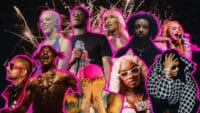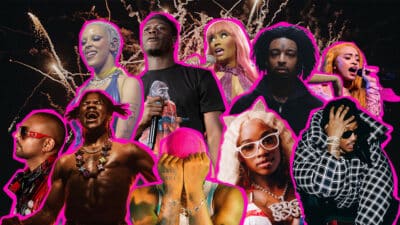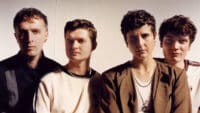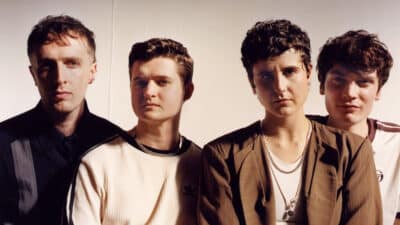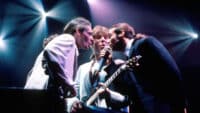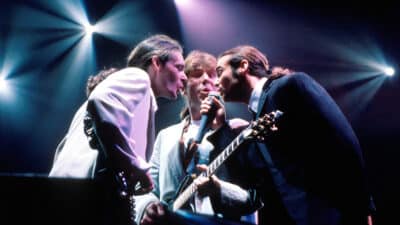Interview
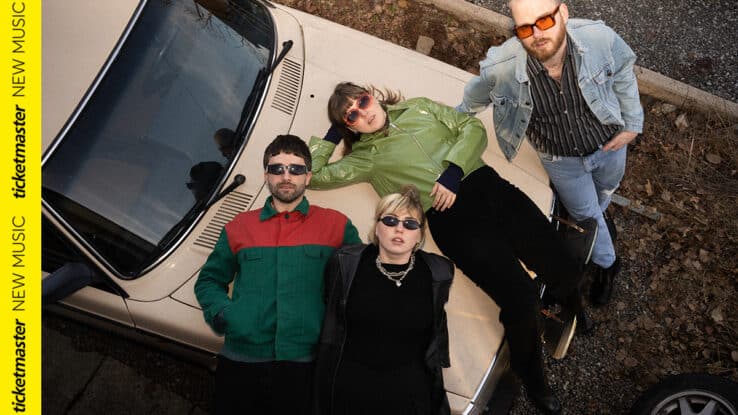
Interview
Girl Scout: “I think there’s still an element of impatience”
Vocalist and guitarist Emma Jansson on life inside the whirlwind of the band rising too fast to keep up with
Girl Scout have definitely earned their music badge. The Stockholm four-piece rose faster than their Spotify releases could keep up – literally. They spent last summer opening for Holly Humberstone, collecting thousands of fans before they’d even released their first single, handing out SoundCloud links to tide them over. Since then they’ve released a string of singles and two EPs and toured with Isle of Wight indie stars Coach Party.
But according to vocalist and guitarist Emma Jansson, the group are living something of a double life. “The routine of touring is kind of nice,” she says, speaking on the phone as she wanders around Oxford, enjoying a short break before the band heads to Rough Trade East London to play an acoustic set. “You have a schedule all day, which is more than I can say for my day to day when I’m at home. In a way, it’s almost a little bit easier to be a functioning person because you just have someone telling you what to do all day and it’s great. It’s like being back in school.”
Life back home in Stockholm is slightly different. “Evelina (Arvidsson Eklind) works at a gift shop for the Nordic museum in Stockholm,” says Jansson. “Viktor (Spasov) is a guitar teacher and Per (Lindberg) is a sound tech. We don’t work full time, but we all work a little bit on the side.” And as for Jansson? “I work at a thrift store,” she says. “I really enjoy it actually. And I have a 30% discount.”
Ahead of Girl Scout’s UK shows, including a stop at London’s Scala, we caught up with Jansson to discuss the band’s quick rise, their shared background in jazz, and how the Beatles inspired the title of their new EP.
How did you all meet?
It’s funny, because we all met in school, but we actually all studied jazz. So it felt very refreshing. We’d all grown up with bands, we were all avid indie rock fans, but we’d obviously dedicated our lives to jazz for a bunch of years. So it was really fun coming back to something else… I hadn’t delved into that genre since I was like 16 or 17.
Why did you guys all end up studying jazz?
I think we all kind of had a similar path. We’d all been playing for a long time, since we were kids. In the Swedish educational system most teachers, at some point, when they feel like you need a challenge, will give you some jazz song to learn. Because it’s just a lot harder than most pop music. It’s just a matter of teachers kind of wanting to broaden your horizons and give you a challenge, and then you kind of fall into it. Because jazz was very different from any other genre. It’s not really a genre that you find, unless your parents are jazz musicians or really big fans. You don’t really stumble upon it. You kind of have to seek it out. There are radio channels in Sweden that are dedicated to jazz and there was a jazz scene, but in order to be exposed to it, you kind of really had to look for it. I think we all kind of stumbled upon it. Everyone started playing jazz, and I feel like for most people, that’s kind of the order that happens: you start playing it, and then you start liking it. It’s like an exercise at first. Also, there’s no indie rock school in Sweden. It’s jazz or classical or Swedish folk music. So a lot of people just kind of fall into one of those three.
Were you expecting to find your way back to indie rock at some point?
I mean, I think I had a looming feeling of like, at some point, it might be fun. And then the pandemic happened, and the school shut down, and there was nothing to do. You couldn’t go to school, there was nowhere to practice. I was like, I might as well just do it now. I have a guitar at home, and I have an electric piano. Me and Viktor already had a folk-ish duo, so we were like, ‘let’s turn it into a band instead’. Evelina and Per were both really interested in joining. So they did, and then it just kind of worked really well from the beginning.
So the group actually formed in lockdown?
Me and Viktor’s duo kind of existed about a year prior to that. We were still working on it, but we were kind of tired of it. It felt a bit limiting. He started writing and doing indie rock stuff for a solo project. So I kind of thought it’d be really fun to do something like that together. The actual band formed right when the pandemic started, I think.
In the Swedish lockdown, everyone was allowed a very close circle of people that they could hang out with in order for people not to be alone. The band kind of became that for us. We met up once a week. There were no venues to play, so the only thing we could really do was meet up and write and record songs. We just started doing that on a weekly basis.
It feels from an outside perspective like it moved very quickly from that point. Did it feel that way for you guys?
Yeah, it definitely did. It was kind of strange. The first two or three months, we just recorded stuff and just put them up on a secret SoundCloud. We started thinking we should maybe send it out to other people and we sent it to a couple of way too big labels. They obviously didn’t respond. So I made an Instagram account and just started following people, kind of randomly, to just have some people see the page. It was funny because an acquaintance of mine had a band, and I just went into their following list and followed a bunch of random people, not thinking anything of it. And then, quite instantly, there was this management company in England who DMed us asking if we had any more songs. We sent the SoundCloud and he was like, “Do you want to have a meeting?” So we got a manager. By that time we’d been around for maybe four months. We’re still working with him too, by the way. He’s wonderful.
We didn’t have anything out at that point, so there was a lot of mystery to kind of lean into. We just had a secret SoundCloud link of demos. We put a lot of work into them, but nobody knew who we were because you couldn’t see or hear us anywhere. And then we got the Holly Humberstone shows…
There was a lot of excitement around you guys on that tour.
We kind of haven’t experienced that level of interest in the same way. Because when you’re an opener, it’s one of those situations where the crowd are either gonna be really into it, or completely uninterested. We didn’t know what to expect. But it was really well received, which was really surprising.
When there was all this interest and you had this collection of demos ready to go, was there a level of impatience on your end to release them? You must have been really ready to get them out in the world.
I feel like there still is an element of that, because we’re still making demos. We have a lot more songs that are basically… maybe not done because obviously they’re demos; we might want to polish them up. But we have a lot of new material that we’re playing live, a lot of things that aren’t released. At this point, we have 10 songs officially out, but I think we have about 60 or 70 finished songs. So I think there’s still an element of impatience. At the beginning, it kind of felt like it was going very fast. But then once you’re in it, you’re like, damn, we have 10 songs out but we’ve existed for three years now. I want to release some more.
It would be fun to release all those songs at some point. I think we’ll be cherry-picking the best ones. But I mean, I think they’re all pretty decent. I have this dream of doing something, like a secret link or something, for fans. Coach Party did this collab with Blood Records. They came out with 3D glasses or something, and you could find a secret link that went to demos and stuff… I thought that was really cool. It’d be fun to do something like that.
As you say, you’ve got 10 songs out at the moment. Are you looking ahead to a potential full-length project in the future?
There’re definitely ideas… But our record contract is up really soon. What’s gonna happen in the future is very based off of what kind of a contract we get. I mean, this is the reality of the world. You’ll really want to do an album, but whether it’s gonna be an album or an EP next is kind of dependent upon that. But yeah, I’m dying to do an album.
Let’s go back to your debut single, which came out last year. Can you tell me about the inspiration behind ‘Do You Remember Sally Moore?’
Actually, Viktor wrote that song. I know the inspiration for the name was that he looked at his bookshelf, and he had a book by Sally Rooney on his bookshelf, and a book by Michael Moore, and he just kind of put them together. The name is definitely fiction, but I think the story is just kind of the experience of having your first really, really big crush in high school and feeling not at all capable of dealing with it. Not to give you a quote on a song that I didn’t write…
How is the writing usually done? Do you go away and write separately, or do you tend to write songs together?
We don’t really have a method; we do a lot of both. Sometimes he’ll write a song and it’s done, and then he’ll just send it over and we’ll start working on it together. And sometimes I’ll just make a song on my own. I think a lot of the ones on the EP are very much a collaborative effort – I’ll write one part, he’ll write the next. Which is nice. We have a lot of musical trust in each other, so we can kind of just piece it together like a jigsaw if we want to. But we can also definitely collab on the structure of the song as well, so it’s very fluid. There’s not really one way that we do it. It’s basically just ‘when you hit a wall, change it up’. And if you don’t, then maybe you’ll just write it on your own. But it’s still gonna be a collaborative effort at the end of the day, which I think is really fun.
So your debut single was one that Viktor brought to you fully finished?
That song was completely done. I think that was one of those songs that kind of just writes itself for him. That was maybe one of the first songs that we ever did as a band. He came to me, I learned it, we changed the key so that was more appropriate for my voice. The arrangement we always do as a group. When it’s done – enough to be sung and played on guitar – we’ll hand it over to the band, and then we collectively make an interpretation of what that song should be.
There must have been quite a lot of pressure on your debut single by that point. How did you settle on that song as the first?
We actually had another song in mind, but you never know what’s gonna pop in the studio. Initially, I think we were talking about having ‘All The Time And Everywhere’, because that was kind of a favourite of ours. Not to say that it’s not still a good song or a favourite, but that recording that we did of ‘Sally Moore’… I think we all just really found it very characteristic and kind of striking. It just felt like a natural kind of way to make an entrance, I guess.
And now you’re on your second EP, just over a year later. I really wanted to ask about the title of Granny Music. Where did that come from?
We were talking about what to name it, and we had a few suggestions, but nothing felt right. I have a hard time with album names because you don’t want it to sound too stiff, I guess, or too contrived. We were talking back and forth. We’re all really big Beatles fans. There’s this story of John Lennon, when Paul was doing songs like ‘Ob-La-Di, Ob-La-Da’ or ‘Maxwell’s Silver Hammer’, which he would describe it as “granny music”. I found that really funny. There’s a lot of references to older generations on this EP. There’re a lot of themes around age and aging, to being a child, but also to relationships with grandparents and stuff like that. There’s a very, very small recording of my grandma talking about her childhood at the end of ‘Millionaire’. You can barely hear it, but it’s like three or four seconds right at the end. So Granny Music actually really works thematically, but it’s also just a Beatles reference. And it’s also really funny because it sounds so unappealing. It’s like the least cool thing you could call it, as an indie band trying to be hip.
Do you have a favourite on the EP?
It tends to not be the singles, because the singles are the ones that you’ve heard the most. We’ve had to shoot videos for them and kind of promote them and hear them on the radio. So it tends to be the songs that don’t get the spotlight as much, partially just because it’s like they’re your children and you want everyone to love them. But I really like ‘Mothers & Fathers’. I really enjoy playing that song live. And I had to fight for that one. That was the song for me that I was most adamant about including. I think people didn’t quite see the vision for a while with that one.
Why did you have to fight for it?
I don’t really know. It’s pretty long. It’s very much a slow burner, and it has such a long build-up. It was an underdog from the get-go – we kind of struggled with how to make it an interesting song because it’s very much the same thing for five minutes. You basically have to make it very dynamic, but you have to make it dynamic in such a way that it doesn’t wear itself out before the five-minute mark. It took a while for it to fall into place. And then with the demo, it took a long time to make because I had an idea of what I wanted it to sound like. I wanted it to be kind of reminiscent of ‘Seventeen Going Under’ or a Bruce Springsteen song. I wanted it to feel very powerful.
I think it was the song that kind of stuck out for a while. ‘Monster’, everyone wanted that one. Especially the label. And ‘Boy In Blue’ and ‘Bruises’ were also givens. But I just wanted ‘Mothers & Fathers’ on there because it felt different from anything else that we’d released prior. I guess I wanted to take the opportunity to kind of branch out a little bit more. Five songs isn’t that many. If you’re doing an album, you can kind of take the listener on a journey. But with five songs you kind of just have to be like, here’re the five best ones. People were a bit hesitant, but I just felt like it was a good risk to take to make sure that we’re not pigeonholing ourselves too much in the 90s indie rock revival.
Looking beyond this EP and these shows, what does the future of Girl Scout look like?
Releasing an album would be so much fun. A headline tour would be really cool. I think we’re really dying to go back to the US – we had such a good time last time. I don’t know… it’s kind of a slow grind. I know that a lot of things look like they happen very quickly from the outside, but when you’re in it, there’s a lot of steps in between that makes it feel a little bit less dramatic. We’re just going to be climbing the ladder a little bit, playing for more and more people, traveling to places we haven’t been and just meeting the fan base, I guess. I think that’s the best part of it for me. I really like when people come up afterwards. I like feeling like we’re friends with our listeners, because we have a pretty major thing in common.




